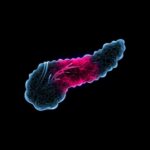Chronic kidney disease affects up to 15% of people worldwide, and more than half of the deaths in those with the condition are caused by heart failure, showing a strong connection between kidney and heart health. Now, researchers have found that modulating the gut microbiota with probiotics improves heart function, at least in mice.
The findings, published in Cell Host & Microbe, indicate that gut microbes could be a target for preventing kidney disease-related heart failure.
The two conditions are connected because damaged kidneys can’t clear gut-derived toxins, which build up, causing inflammation and ultimately damaging the heart. Recent research has shown that Escherichia coli drives the production of a specific gut-derived toxin, which may be a target for therapies to protect both the kidneys and heart.
Following up on this observation, researchers led by Yun Zhang at Southern Medical University in Guangzhou, China, set out to investigate how gut bacteria—particularly E. coli—contribute to heart failure in chronic kidney disease. To do so, the team studied the microbiota of healthy people, people with chronic kidney disease, and people with both chronic kidney disease and heart failure.
Heart damage
People with chronic kidney disease and heart failure had higher levels of E. coli and Enterococcus faecium, the researchers found. To test whether these bacteria contribute to heart problems, the team transplanted gut bacteria from these people into rats, which then developed signs of heart damage. Further experiments showed that people with chronic kidney disease and heart failure had higher levels of indoxyl sulfate, a harmful byproduct of gut bacteria, mainly E. coli.
Giving E. coli to rats with chronic kidney disease raised indoxyl sulfate levels and caused more heart cell damage, while E. coli had no effect in healthy rats. A strain of E. coli that couldn’t produce indoxyl sulfate didn’t cause heart problems.
When human heart muscle cells were exposed to high levels of indoxyl sulfate, the cells became damaged and started dying, the researchers found.
Microbiota-targeted intervention
Indoxyl sulfate appeared to increase the activity of a gene called CYP1B1, which disrupts mitochondria—the cell’s energy factories—causing cell death and energy loss. Blocking this gene in heart cells or in rats with chronic kidney disease improved cell survival and protected heart function.
In rats with chronic kidney disease, a probiotic called DM02—made of Lactobacillus reuteri and L. plantarum—reduced E. coli in the gut, lowered the levels of indoxyl sulfate, improved heart function, and prevented cell death. In a small clinical study with people with chronic kidney disease, DM02 also reduced gut E. coli and circulating indoxyl sulfate levels.
“These findings underscore the critical role of gut microbiota in chronic kidney disease-related heart failure and suggest a microbiota-targeted therapeutic and diagnostic strategy for clinical intervention,” the authors say.









